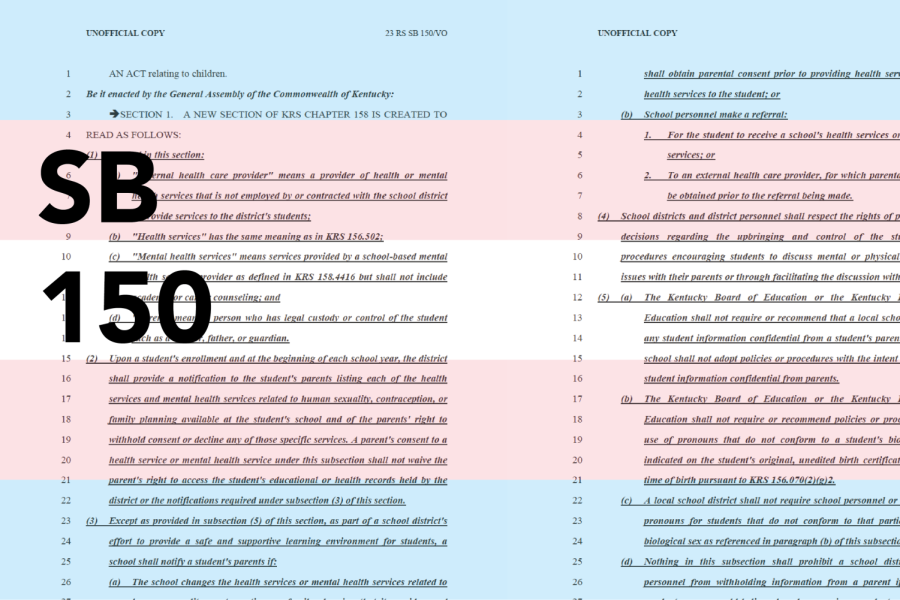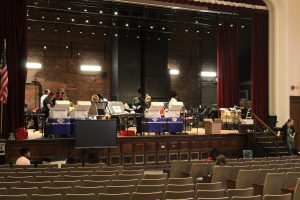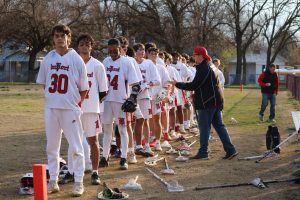With SB 150 passed, what’s next?
Senate Bill (SB) 150 passed in the 2023 General Assembly by a comfortable margin after weeks of drama, but many teachers and students are still unsure what the bill’s effects on their classrooms will be. Graphic by Brennan Eberwine
May 24, 2023
During the 2023 regular session the Kentucky General Assembly passed Senate Bill (SB) 150 into law. The law has expansive language on a wide range of topics including banning gender-affirming care for minors (including puberty blockers), a ban on a student using bathrooms that don’t align with their birth sex, “Don’t Say Gay” provisions and a provision preventing districts from issuing guidance on pronouns to teachers.
This law is the culmination of several laws that were filed by various sponsors in the legislature this year of varying degrees of severity. Much of the language was originally a part of House Bill (HB) 470, criticized as too harsh by some lawmakers and although it was able to pass out of the Senate, its future was unclear in the House of Representatives. SB 150, originally a bill restricting pronouns sponsored by Sen. Max Wise (R-Campbellsville) was passed as a substitute out of a committee meeting called mere minutes before it started.
Despite its comfortable passage through the Republican-controlled legislature, questions continue to swirl about its implementation and what exactly some of the language means. An unsupportive Kentucky Department of Education (KDE) has released guidance on all sections, noting conflict the law runs into with established federal laws such as Family Educational Rights and Privacy Act (FERPA) in regards to student privacy and the definition of parent.
The KDE is also now unable to provide guidance to school districts on using students preferred pronouns; it previously recommended that teachers used students preferred pronouns, attracting the ire of Kentucky Republicans in the General Assembly.
Guidance also states schools are required “to ensure any child, regardless of grade level, enrolled in the district does not receive any instruction or presentation that has a goal or purpose of students studying or exploring gender identity, gender expression or sexual orientation.” Language intended to implement “Don’t Say Gay” language. However, SB 150 does specifically note teachers are allowed to discuss “human sexuality, including the sexuality of any historic person, group, or public figure, where the discussion provides necessary context in relation to a topic of instruction.” KDE noted the changes made by SB 150 no longer allows for discussion of puberty and basic reproductive functions to 5th grade students.
The vagueness of the “Don’t Say Gay” language has left Manual teachers confused on what they’re allowed to cover or even say in class.
“Upon the passing of SB 150, several teachers in the building expressed concerns on how this would impact them and their students. Specifically, English teachers asked me as the department chair what we should know and if we should have a professional development session to address this. Dr. Newman told teachers to wait until we had guidance from KDE and JCPS. The guidance from KDE is only two pages and seems to really only address health and human sexuality courses,” Ms. Thayne Bruszewski (English) said in an email.
Many teachers around Manual have begun wearing tags on their lanyards stating “I’m Here” displaying pride flags showing support of LGBTQ+ students. Students are also worried about what next year would look like for their peers and expressed frustration with the laws.
“I feel for people who are affected by this and even though it’s not directly affecting me I still care about it.” Gracie Tomes (11, HSU) said. “It shouldn’t have passed”
Although Tomes thinks the Manual community would continue to respect student’s identities, they worried about what the law would mean for students with less supportive parents.
“There’s already some teachers that are going to misgender people no matter what whether or not it’s supposed to be a rule but now that they can just put a student in danger of possibly being kicked out or something really bad with their family life it’s really unsafe,” Tomes said.
SB 150 has also mandated school districts must “ not allow students to use restrooms, locker rooms, or shower rooms that are reserved for students of a different biological sex” and are required to provide the “best available accommodation” for students who identify with a different gender than their biological sex. KDE’s recommendation does note this guidance could potentially run afoul with Title IX.
“Legal counsel for JCPS continue to review the provisions of SB 150 that might impact our schools, students and staff. Discussions are ongoing regarding policy changes that may be required by the legislation. Additionally, JCPS anticipates new Title IX regulations to inform policies related to SB 150. We are also monitoring any legal challenges that may be filed,” JCPS spokesperson Mark Hebert said in a request for comment.”
As school districts and the KDE continues to review its curriculum and standards, it’s likely the effects of SB 150 will continue to unfold throughout the next few years in Kentucky public schools.
This story is a part of continuing coverage.











Mary Strange • May 24, 2023 at 8:21 pm
Freedom of speech please. This is ridiculous. The government cannot tell us what to or not to say. Schools need to be a safe haven no matter what. You have corrupted with this law. I’m disappointed in Kentucky. I will not be voting for anyone who made this law pass. I’m physically sick and sad for the future of our citizen.